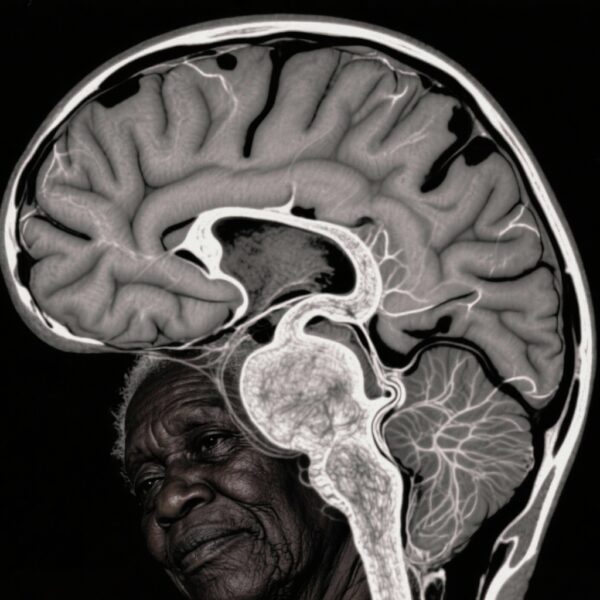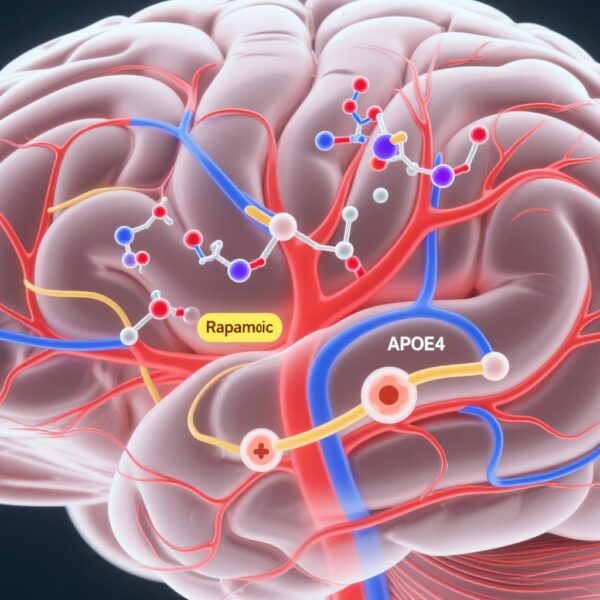Highlight
- APOE4 carrier status accentuates the impact of blood neurodegenerative biomarkers—total tau, neurofilament light chain, and GFAP—on cognitive decline in older adults without dementia.
- A 20-year prospective biracial cohort study demonstrated that APOE4 carriers showed significantly faster cognitive deterioration associated with elevated serum biomarker levels compared to noncarriers.
- These findings underscore the importance of including genetic susceptibility markers like APOE4 in studies and clinical trials targeting neurodegeneration and cognitive aging.
Study Background
The apolipoprotein E epsilon 4 allele (APOE4) is a well-established genetic risk factor for late-onset Alzheimer’s disease (AD) and related cognitive decline. However, the precise role of APOE4 in modulating the relationship between neurodegenerative processes and cognitive trajectory in aging populations remains incompletely understood, especially in diverse community-dwelling cohorts without baseline dementia. Blood-based biomarkers reflecting neurodegeneration, axonal injury, and neuroinflammation, such as total tau (t-tau), neurofilament light chain (NfL), and glial fibrillary acidic protein (GFAP), have emerged as promising tools for detecting ongoing neuronal injury and glial responses that precede clinical dementia. Existing population studies often lack comprehensive biomarker-genetic interaction data in longitudinal frameworks and underrepresent racially diverse elderly adults. This study, therefore, addresses a critical gap by examining whether APOE4 influences the association of serum neurodegenerative biomarkers with cognitive decline over two decades in a biracial sample from the Chicago Health and Aging Project (CHAP).
Study Design
This research leveraged data from the CHAP, a longitudinal population-based cohort study on the South Side of Chicago initiated in 1993. The study cohort comprised 1038 community-dwelling adults aged approximately 77 years at baseline (mean age 77.1 ± 5.9), without dementia, including 59.2% Black and 40.8% White participants, and 62.7% female. APOE4 carrier status was determined genetically at baseline. Serum concentrations of total tau, NfL, and GFAP were quantified utilizing the highly sensitive Quanterix Neuroplex platform. Cognitive function was repeatedly assessed across multiple waves during up to 20 years of follow-up, using comprehensive neuropsychological batteries consolidated into a composite global cognition score. Mixed-effects regression models adjusted for demographic variables (age, sex, race, education) and chronic health conditions assessed the interaction between APOE4 status and biomarker levels on the trajectory of cognitive decline.
Key Findings
Among the sample, 33.0% were APOE4 carriers. Elevated serum biomarkers of neurodegeneration were linked to faster cognitive decline specifically among APOE4 carriers:
– For each 1-log10 unit increase in total tau, APOE4 carriers exhibited an accelerated annual cognitive decline with a beta coefficient (β) of -0.03 (SD 0.02; P = .046) greater than noncarriers.
– Similarly, elevated GFAP levels corresponded to an increased decline rate in APOE4 carriers (β = -0.07 ± 0.03; P = .02).
– Regarding NfL, APOE4 carriers in the middle tertile showed a significant acceleration of cognitive deterioration (β = -0.04 ± 0.02; P = .006) compared to noncarriers in the lower tertile. The trend towards accelerated decline for APOE4 carriers in the upper NfL tertile was present (β = -0.03 ± 0.02; P = .07) but did not reach statistical significance.
These findings demonstrate that the presence of APOE4 modifies the impact of blood neurodegenerative and glial biomarkers on long-term cognitive trajectories. Notably, these associations remained robust despite adjustment for confounders including race, education, and chronic illnesses, thus affirming the genetic modulation of biomarker-related neurodegeneration.
Expert Commentary
The interplay between APOE4 genotype and biomarkers like t-tau, NfL, and GFAP provides mechanistic insight into how genetic risk predisposes individuals to accelerated neurodegeneration and cognitive decline even in preclinical stages. Total tau is indicative of neuronal injury and neurofibrillary pathology, NfL reflects axonal damage, and GFAP marks astrocytic activation and neuroinflammation. The synergistic effect observed in APOE4 carriers suggests a heightened vulnerability to these pathological processes. By including a racially diverse population, this study addresses a literature gap often limited by homogenous samples, enhancing its generalizability.
Limitations include reliance on serum biomarker levels measured at a single baseline point, which may not capture dynamic neurodegenerative changes over time. Also, while cognitive composite scores are valuable, clinical diagnosis and differential progression in specific dementias were not extensively delineated. Future investigations integrating neuroimaging and longitudinal biomarker measures could further clarify temporal dynamics.
Conclusion
This long-term biracial cohort study conclusively shows that APOE4 carrier status significantly intensifies the association between elevated blood-based neurodegenerative biomarkers and cognitive decline in community-dwelling older adults without dementia at baseline. Incorporating APOE4 genotype in research and clinical trials is essential to appropriately stratify risk, interpret biomarker findings, and develop personalized interventions to mitigate neurodegenerative progression. These insights offer valuable direction for early detection strategies and highlight the potential of blood biomarkers combined with genetic profiling to transform aging brain health assessment.
Funding and ClinicalTrials.gov
The Chicago Health and Aging Project (CHAP) was supported by grants from the National Institute on Aging and other federal funding agencies. This observational study did not involve a clinical trial registration number.
References
Ng TKS, Beck T, Boyle P, Dhana K, Desai P, Evans DA, Rajan KB. APOE4, Blood Neurodegenerative Biomarkers, and Cognitive Decline in Community-Dwelling Older Adults. JAMA Netw Open. 2025 May 1;8(5):e258903. doi: 10.1001/jamanetworkopen.2025.8903. PubMed PMID: 40332937; PMCID: PMC12059971.
Additional literature:
– Jack CR Jr, et al. NIA-AA Research Framework: Toward a biological definition of Alzheimer’s disease. Alzheimers Dement. 2018;14(4):535–562.
– Hampel H, et al. Blood-based biomarkers for Alzheimer’s disease: mapping the road to the clinic. Nat Rev Neurol. 2018;14(11):639–652.


